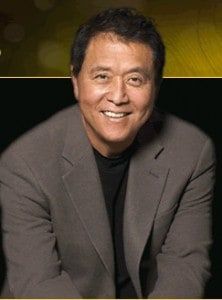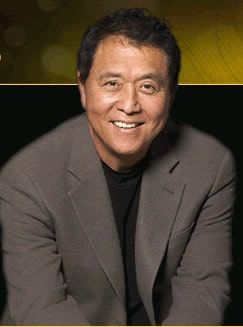 A story came across the news this weekend about Robert Kiyosaki, the author of Rich Dad, Poor Dad, and how his company went bankrupt last month. Basically, the company didn’t pay the proper royalties on its seminars, and when they lost in court, they didn’t have enough money to pay at all. It wasn’t a personal bankruptcy, rather, a corporate bankruptcy. However, a corporation with money should be able to pay up for a minor royalty dispute (only $23 million compared to $400+ million in revenues). And when your name is attached to a company, and your business is built around creating wealth, the word bankruptcy associated with it usually isn’t a good thing.
A story came across the news this weekend about Robert Kiyosaki, the author of Rich Dad, Poor Dad, and how his company went bankrupt last month. Basically, the company didn’t pay the proper royalties on its seminars, and when they lost in court, they didn’t have enough money to pay at all. It wasn’t a personal bankruptcy, rather, a corporate bankruptcy. However, a corporation with money should be able to pay up for a minor royalty dispute (only $23 million compared to $400+ million in revenues). And when your name is attached to a company, and your business is built around creating wealth, the word bankruptcy associated with it usually isn’t a good thing.
However minor you may consider it, I find it appalling as a personal finance writer. This guy made a living on selling “his story” and encouraging others to fork out tons of money to hear it. In the end, the story crumbles, and it just makes him a hypocrite.
Practice What You Preach
What upsets me the most is that Kiyosaki is portrayed by many as a financial guru. His Rich Dad, Poor Dad book made him famous because of the practical advice that he pretended to gain throughout his life. He talks about life lessons learned, and how that allowed him to do great things in real estate and other ventures.
The problem?
- Prior to his 1997 publication of Rich Dad, Poor Dad, Robert Kiyosaki never had any documentation of the wealth he supposedly amassed (Forbes)
- There really wasn’t a rich dad, even though his book specifically claims there was one (Smart Money Magazine, February 2003)
In the end, this “non-fiction” story is just fiction, and so it calls into doubt the advice he gives to readers and followers.
Even though his advice may sound good: be an owner, invest in cash flow investments, etc – the fact that he (or his business) didn’t maintain solid financial health is sad.
Don’t Prey on Your Followers
Another big red flag for me is preying on your followers. This is hypocrisy at its worst. If you’re selling yourself as a model for something (values, wealth creation, business, or even how you coach your kid’s soccer team), don’t use your followers and believers – empower them.
Robert Kiyosaki wrote and sold his book, which I consider to be honorable. He then tacked on a class, which was free, which is also honorable. But then he started preying on his followers –
- Class #1 – Free Advice
- Class #2 – Paid Advice, $495 (However, very little education and more marketing for class #3)
- Class #3 – Paid Advice $45,000 (Yes…that’s not a typo)
If you’re a financial planner, I think it is fair to charge for advice. However, it is important to be reasonable for your services. If you’re trying to help someone get rich, and provide value, $495 could be reasonable. But how could $45,000 be reasonable for any personal finance class? Furthermore, would you ever pay that given the credibility issues raised by the teacher?
Kiyosaki Isn’t The Only One
The sad fact is that Robert Kiyosaki isn’t the only one. There are hundreds of financial hypocrites out there. There are even more people out there that have hypocritical moments (I’m sure I have as well).
Just think:
- Suze Orman launching a prepaid credit card
- Donald Trump’s company declaring bankruptcy 4 times
- Ray Lucia, author of Buckets of Money, charged by SEC as misleading
It just really offends me when I see people almost victimized trying to get rich. I’m a firm believer that anyone can make $1,000,000 or more. Heck, read my article and it’s actually pretty easy.
Kiyosaki was just one, but there are hundreds, if not more, people doing the same exact thing!
It doesn’t take shelling out thousands of dollars for courses from potentially hypocritical speakers. Just earn, save, get out of debt, and invest. Done.
Don’t Get Me Wrong On His Book
I will add one last thought here though – don’t get me wrong on many of the financial tenets he teaches in his book. Just like many people in the media, there are some things I agree with him with, but many things I don’t.
For example, he idea of buying assets versus liabilities is spot on. He advocates spending responsibly, and really knowing what you’re spending money on. However, I completely disagree with his business tactics of large upsells to get people started investing in real estate. If you want to get invested in real estate, skip that seminars and start investing with just $500 on platforms like Fundrise.
So, my final thought is, don’t fall for the hype. Read his book Rich Dad, Poor Dad for yourself, and realize when people are being hypocrites or selling something you don’t need.
What do you think of this latest act of financial hypocrisy? Can you think of other financial pundit hypocrites?

Robert Farrington is America’s Millennial Money Expert® and America’s Student Loan Debt Expert™, and the founder of The College Investor, a personal finance site dedicated to helping millennials escape student loan debt to start investing and building wealth for the future. You can learn more about him on the About Page or on his personal site RobertFarrington.com.
He regularly writes about investing, student loan debt, and general personal finance topics geared toward anyone wanting to earn more, get out of debt, and start building wealth for the future.
He has been quoted in major publications, including the New York Times, Wall Street Journal, Washington Post, ABC, NBC, Today, and more. He is also a regular contributor to Forbes.
Editor: Chris Muller
